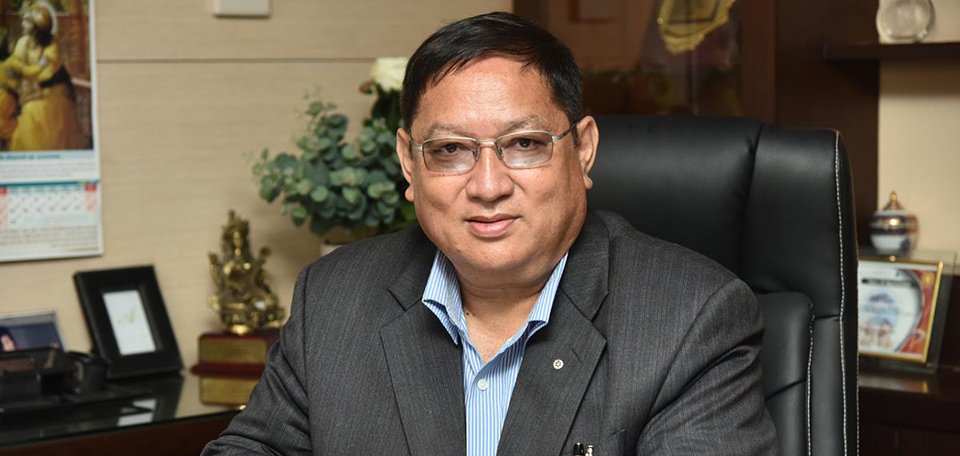Nepal will bolster health manpower for COVID-19 response: Shrestha

By A Staff Reporter
Kathmandu, Sept. 8: The government has resolved to restructure health sector to make the health system more relevant and effective.
Speaking at a ministerial round table during the Regional Committee meeting of WHO South-East Asia, State Minister for Health and Population (MoHP) Umesh Shrestha said, “We are restructuring health sector to make our health systems more relevant and effective to tackle emerging public health challenges.”
Nepal is establishing Centre for Disease Control (CDC), and another entity for food safety, antimicrobial resistance and zoonotic diseases based on ‘one health’ approach, said State Minister Shrestha.
State Minister Shrestha further said, “Nepal is recruiting additional health workers for COVID-19 response allowing federal, provincial and local governments to contract dedicated workforce, thereby freeing regular health cadres to continue providing routine health services.”
“We are reviewing job functions and skills to mobilise the workforce more effectively and deploy public health managers at all 753 local levels to deliver essential health care services and respond to future public health emergencies in their respective constituencies,” added Shrestha.
Taking lessons from the ongoing pandemic and emphasising a once-in-a-century opportunity, the countries of WHO South-East Asia Region, on Tuesday, adopted a Ministerial Declaration resolving to strengthen health system resilience to ensure health security and achieve universal health coverage and Sustainable Development Goals for health.
“Strong health systems that are primary health care-oriented, and which leave no one behind, create populations that are healthier, more productive and financially secure. Resilient health systems are the bedrock of emergency preparedness and response, and ensure that when acute events occur, essential health services can be maintained,” said Dr. Poonam Khetrapal Singh, Regional Director, WHO South-East Asia, at a ministerial round table of the Regional Committee meeting.
Through the Declaration adopted at the ministerial round table, the membercountries committed to providing political leadership and accountability to advance health security and progress towards universal health coverage and the health-related SDGs.
The member countries resolved to reorient health systems towards comprehensive primary health care through increased public investments, as the foundation for strengthening both public health emergency capabilities and achievement of universal health coverage.
“The pandemic has highlighted the urgency and importance of investment in human resource for health, especially at the primary health care level, and the need for adequate supply of affordable, effective, quality and safe medical products to ensure an effective response to public health emergencies and to build resilient health systems,” said the Regional Director.
The Declaration also commits to closer engagement with and the empowerment of communities to maintain the delivery of essential health services and public health programmes during and after the pandemic.
To roll-out effective response for at-risk and affected communities, the member countries agreed to ensure integration of public health emergencies and disaster risk management strategies, as well as strengthening surveillance and preparedness capacity at the primary health care level.
The member countries additionally resolved to accelerate integration of non-communicable diseases including mental health, and other programmes, at the primary health care level, as well as establishing national quality standards for primary health care services and ensuring access to quality health services during the pandemic and recovery phase.
The member countries further agreed to appropriately leverage the potential of traditional systems of medicine while optimising innovations in digital health technologies.
The declaration emphasised the importance of leveraging additional resources and partnerships, including the important role of WHO, to support the development of national capacities to address public health emergencies and ensure the delivery of high-quality health services for all.
“Together we are stronger. Together we can build back better essential health services, for a fairer, healthier and more health-secure future for all, leaving no one behind,” the Regional Director said.
Recent News

Do not make expressions casting dout on election: EC
14 Apr, 2022
CM Bhatta says may New Year 2079 BS inspire positive thinking
14 Apr, 2022
Three new cases, 44 recoveries in 24 hours
14 Apr, 2022
689 climbers of 84 teams so far acquire permits for climbing various peaks this spring season
14 Apr, 2022
How the rising cost of living crisis is impacting Nepal
14 Apr, 2022
US military confirms an interstellar meteor collided with Earth
14 Apr, 2022
Valneva Covid vaccine approved for use in UK
14 Apr, 2022
Chair Prachanda highlights need of unity among Maoist, Communist forces
14 Apr, 2022
Ranbir Kapoor and Alia Bhatt: Bollywood toasts star couple on wedding
14 Apr, 2022
President Bhandari confers decorations (Photo Feature)
14 Apr, 2022










